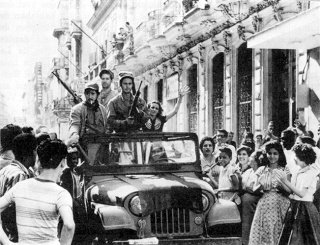 By the end of 1958 wholesale army desertion, growing popular unrest and violence and U.S. increasing opposition had made Fulgencio Batista’s position untenable. He resigned in the early hours of New Year’s Day and fled to the Dominican Republic. Within hours the regime collapsed and the guerrillas from the Sierra Maestra, led by Camilo Cienfuegos and Che Guevara, entered Havana. Their leader Fidel Castro, chose to make his own triumphal entry into Santiago, delivering his victory speech there, and only arriving in the capital a week later.
By the end of 1958 wholesale army desertion, growing popular unrest and violence and U.S. increasing opposition had made Fulgencio Batista’s position untenable. He resigned in the early hours of New Year’s Day and fled to the Dominican Republic. Within hours the regime collapsed and the guerrillas from the Sierra Maestra, led by Camilo Cienfuegos and Che Guevara, entered Havana. Their leader Fidel Castro, chose to make his own triumphal entry into Santiago, delivering his victory speech there, and only arriving in the capital a week later.
Emphasizing his commitment to democracy and social reform and promising free elections, Castro denied he was a Communist, described the Revolution as humanistic, and promised a nationalist government that would respect private property and Cuba’s international obligations.
To consolidate his domestic support, he introduced several reforms. He confiscated wealth “illegally” acquired by Batista’s followers. He substantially reduced rents paid by house and apartment occupiers. And an agrarian reform was enacted, confiscating large holdings to supposedly create a nation of small farmers.
Throughout 1959 the radicalization of the Revolution took place, accompanied by the defection or purge of the more moderate leaders and their replacement by more extreme, and oftentimes Communist, militants. This was followed by massive confiscation of private property both domestic and foreign. The failure of the Bay of Pigs invasion in 1961 consolidated Castro’s power and effectively crushed the internal opposition. The regime was declared to be socialist. Economic centralization increased, private schools and the press fell under government control. This was accompanied by a nationwide literacy campaign and an increase of educational facilities. Sanitation, public health, and health care improved with the establishment of rural hospitals under state control. Religious institutions were suppressed, and foreign-born clergy expelled from Cuba.
By 1961 the Cuban Revolution had passed beyond mere reform and was embarking upon a drastic overturn of the existing order. What had begun as an armed protest against a military dictatorship now strove to abolish completely the traditional Cuban social system based on private property, democratic institutions, and constitutional guarantees of individual rights. Castro’s goal became the classic Marxist one of abolishing the traditional social classes in favor of the ultimate classless society where all are equal, with neither “exploiters” nor “exploited.” The Revolution changed the societal givens drastically when property was seized without compensation, claiming to offer in return state-provided social welfare. Those preferring economic (or political) liberty had to join the exodus abroad, although by now most of them had lost everything.
By mid-1961 all the groups that had fought Batista had been merged into the Organizaciones Revolucionarias Integradas, preparatory to the 1963 Partido Unido de la Revolucion Socialista, later transformed into the Partido Comunista de Cuba. By December 1961, Castro had openly espoused Communism and established close relations with the Soviet Union. In the countryside, the second of Castro’s agrarian reform laws in 1963 promoted government controlled cooperatives, which were gradually converted into granjas del pueblo, (state farms), worked by government employees. A new élite group emerged as the coterie around Fidel, whose strength derived from their sweeping political and economic power, the nomenklatura of the communist state apparatus.








